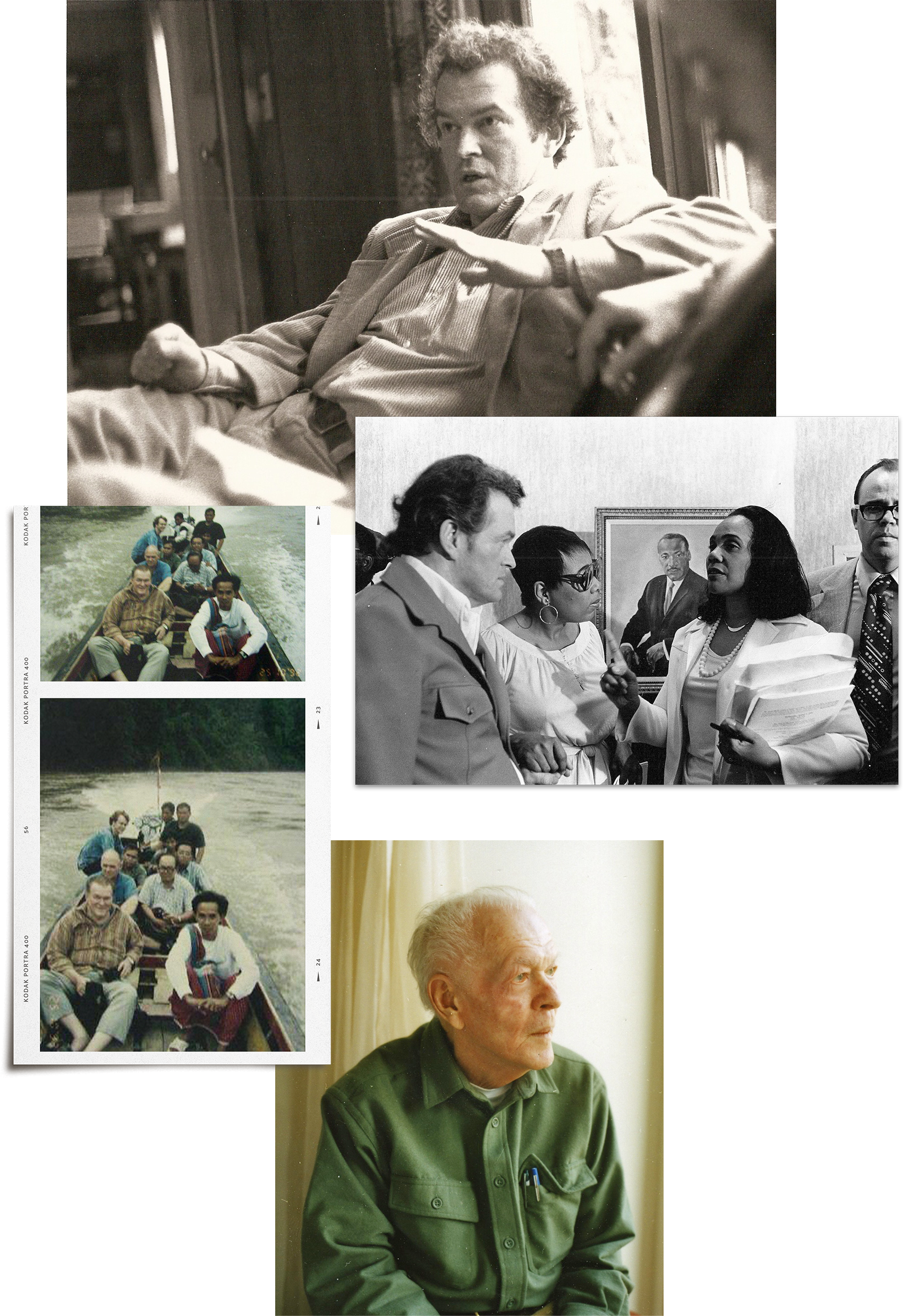/OUR HISTORY
Dr. GENE SHARP (1928-2018)
Dr. Gene Sharp, who has been called “the Clausewitz of nonviolent warfare,” founded the Albert Einstein Institution (AEI) in 1983 to promote research, policy studies, and education on the strategic uses of nonviolent struggle in face of dictatorship, war, genocide, and oppression. He served as the Institution’s Senior Scholar from 1983 until his passing in 2018.
In an academic and professional career spanning more than six decades, Gene Sharp became a prominent political theorist who studied and advanced the cause of nonviolent action for social and political change. His ideas and writings, along with his close study of Gandhi and dictatorships, have informed nonviolent struggles for freedom around the world.
A social sciences graduate of Ohio State University (B.A., 1949, with honors in political science, debate and sociology), Dr. Sharp continued his studies at Ohio State, earning his Master of Arts in sociology in 1951. He concentrated in sociological theory with additional work in inter-group relations, social psychology and anthropology. He wrote his master’s thesis on the sociology of nonviolence.
Dr. Sharp held two honorary doctorates, Doctor of Humane Letters (2012) from Brown University and Doctor of Laws (1983) from Manhattan College. He has received numerous honors and awards for his work, including the El-Hibri Peace Education Prize and the Right Livelihood Award, which was presented in the Swedish Parliament in 2012.
Dr. Sharp is the author of various books and many other publications on nonviolent struggle, power, political problems, liberation struggle, dictatorships, and defense policy. His writings have been published in over 45 languages, including Norwegian, German, French, Italian, Arabic, Hebrew, Tamil, Burmese, Karen, Thai, Spanish, Chinese, Korean, and Japanese.
“The fall of one regime does not bring in a utopia. Rather, it opens the way for hard work and long efforts to build more just social, economic and political relationships and the eradications of other forms of justice and oppression.”
DR. GENE SHARP
(1928-2018)
Work & Publications
From 1951 until 1955, Gene Sharp lived in New York City conducting independent studies on the history of nonviolent action and the life and work of Gandhi. That work led to his first book, Gandhi Wields the Weapon of Moral Power: Three Case Histories, completed in 1953 and published in 1960 with a foreword by Albert Einstein. During his New York years, Dr. Sharp was arrested for civil disobedience to military conscription during the Korean War, for which he spent nine months in prison.
In 1955, Dr. Sharp became assistant editor of Peace News in London. Later, he was a lecturer at the Institute for Philosophy and the History of Ideas of the University of Oslo and a research associate at the Institute for Social Research in Oslo.
From 1960 to 1964, he undertook doctoral studies at St. Catherine’s College, Oxford, His D.Phil. from Oxford, awarded in 1968, focused on theories of the nature of political power and the history, methods and dynamics of nonviolent struggle.
In 1965, he became a research associate at the Center for International Affairs at Harvard University, a position he held for nearly 30 years. He also taught political science and sociology at the University of Massachusetts–Dartmouth.
In 1983, Dr. Sharp founded the Albert Einstein Institution, a nonprofit organization that supports research and policy studies on strategic nonviolent action and has consulted with resistance and pro-democracy groups in Burma, Thailand, Tibet, Latvia, Lithuania, Estonia, Belarus, and elsewhere. He served as senior scholar at AEI in Boston until his passing in 2018, and was professor emeritus of political science at the University of Massachusetts–Dartmouth.
Dr. Sharp’s The Power and Practice of Nonviolent Struggle (in Tibetan; 1999) carried a Foreword by the Dalai Lama.
His more recent works include: Waging Nonviolent Struggle: 20th Century Practice and 21st Century Potential (2005), and How Nonviolent Struggle Works (2013). His book, Dr. Sharp’s Dictionary of Power and Struggle (2011), represents the culmination of decades of study and thought and is a groundbreaking reference work that defines the key concepts and terms surrounding nonviolent struggle.
His first book, Gandhi Wields the Weapon of Moral Power (1960), included a foreword by Albert Einstein and an introduction by Bharatan Kumarappa. Dr. Sharp was also co-editor of Resistance, Politics, and the American Struggle for Independence (1986) and of Nonviolent Action: A Research Guide (1997), as well as a contributor to several encyclopedias.
His recent shorter writings include: “From Dictatorship to Democracy” (translated into 42 languages; 1993, 2002, and 2003), “The Anti-Coup” (co-author; 2003), “There Are Realistic Alternatives” (2003), and “Self-Liberation” (2010).
Additionally, Dr. Sharp prepared simplified presentations on the nature of nonviolent struggle and its applications against dictatorships and coups d’état. He conducted workshops and consulted on strategic nonviolent struggle internationally in severe crisis situations.
Dr. Sharp was convinced that pragmatic, strategically planned nonviolent struggle can be made highly effective for application in conflicts to lift oppression and as a substitute for violence.
His books include:
The Politics of Nonviolent Action (1973; Introduction by Thomas C. Schelling)
Making Europe Unconquerable (1985; Foreword by George F. Kennan)
Civilian-Based Defense (1990)
Social Power and Political Freedom (1980; introduction by Senator Mark O. Hatfield)
Gandhi as a Political Strategist (1979 and 1999; introduction by Coretta Scott King and foreword by Frederico Mayor)
The Einstein Connection
After graduating from Ohio State in 1951, Gene Sharp moved to New York City where he worked odd jobs and spent his spare time working on a book about the Indian political leader Mohandas Gandhi. The U.S. was involved in fighting the Korean War and Dr. Sharp refused to cooperate with the draft by not reporting for physical examinations or carrying a draft card.
“I had chose a particular kind of conscientious objection, I guess the most obnoxious kind that existed – civil disobedience.”
Dr. Sharp was charged with draft evasion, which was a criminal offense punishable by up to 14 years in prison. In 1953, at the age of 25, he was arrested by the FBI and locked in a federal detention center to await his trial. It was during this time that he wrote to physicist Albert Einstein, asking if he would be willing to write the foreward to his book about Gandhi.
Einstein, who had become a pacifist later in his life, agreed that he would.
At his eventual trial, Dr. Sharp was sentenced to 2 years in prison during which time his correspondence with Einstein continued, including finding a potential publisher for Dr. Sharp’s book.
Dr. Sharp was released from prison after serving 9 months and 10 days. Unfortunately, Einstein passed away before his release and the two were never able to meet in person. However, Dr. Sharp was granted permission to use his name when he founded the Albert Einstein Institution in 1983.
In 2016, Dr. Sharp’s collaborator and current Executive Director of the Albert Einstein Institution, Jamila Raqib, made an incredible find: a box containing the correspondence between Albert Einstein and the 25-year-old Sharp.
Written during the last two years of Einstein’s life, the letters show how the two thinkers grappled with some of the most profound challenges of the 20th century: war and violence, totalitarianism, the degradation of civil liberties, and attacks on academic freedom. It’s evident that the McCarthyism of the era weighed heavily on Einstein’s mind as he offered steadfast support to Dr. Sharp and addressed the “conflict between political obligation and moral conscience.”


